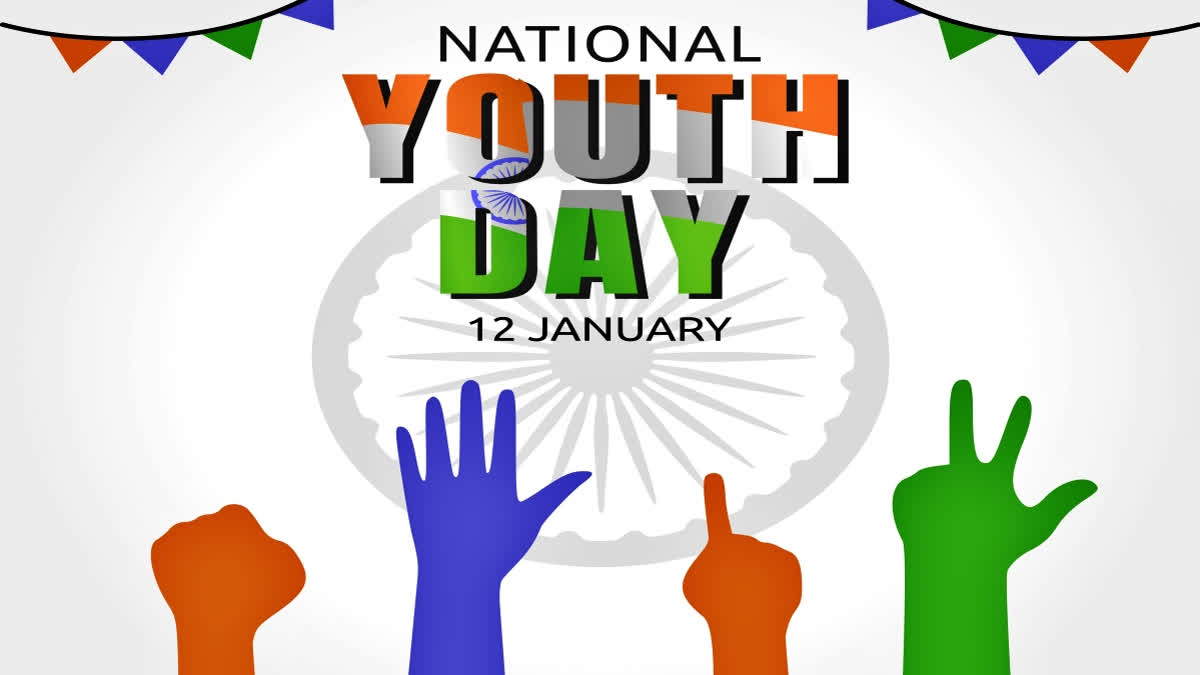Hyderabad: National Youth Day, celebrated on January 12 annually across the country, commemorates the birth anniversary of Swami Vivekananda, the Indian monastic who registered his legacy with his philosophy and lifestyle.
NYD history- Designated by the government of India in 1984, National Youth Day pays tribute to the visionary leader who played a significant role in inspiring and guiding the youth of not only India but across the globe. Vivekananda's teachings continue to resonate, emphasising the importance of channeling youth energy for the betterment of society and the nation.
Vivekananda's family- Swami Vivekananda was born on January 12, 1863 in Kolkata. His father Vishwanath Dutta, a popular lawyer of the High Court, who named his son Narendra, had nurtured a desire for his son to attain English education and become a great man.
Vivekananda's journey- Born as Narendra Nath Datta in Kolkata on 12 January 1863, Swami Vivekananda had exceptional skills in music, gymnastics, and academics during his youth. His spiritual journey began in the year 1881 after he encountered Sri Ramakrishna, a revered spiritual master. Vivekananda straightaway questioned Sri Ramakrishna whether he ever had seen God.
Sri Ramakrishna- Without a moment’s hesitation, Sri Ramakrishna replied "Yes, I have. I see Him as clearly as I see you, only in a much intenser sense." The profound impact of this meeting marked the start of a unique guru-disciple relationship, steering Vivekananda towards a life dedicated to spiritual pursuits.
Vivekananda’s iconic Chicago speech- The turning point in Vivekananda's life came during his iconic speech at the Parliament of the World's Religions in Chicago on September 11, 1893. With the famous opening remarks, "Sisters and brothers of America," he introduced Hinduism and Indian spirituality to the Western world. His message of universalism, tolerance, and the spiritual essence of Hinduism left an indelible mark, fostering global interfaith dialogue.
Top comments from Swami Vivekananda's iconic speech:
- ''I am proud to belong to a religion which has taught the world both tolerance and universal acceptance."
- "We believe not only in universal toleration but we accept all religions as true."
- "I fervently hope that the bell that tolled this morning in honor of this convention may be the death knell of all fanaticism, of all persecutions with the sword or with the pen, and of all uncharitable feelings between persons wending their way to the same goal."
- "The Christian is not to become a Hindu or a Buddhist, nor a Hindu or a Buddhist to become a Christian. But each must assimilate the spirit of the others and yet preserve his individuality and grow according to his own law of growth."
- "As the different streams having their sources in different places all mingle their water in the sea, so, O Lord, the different paths which men take through different tendencies, various though they appear, crooked or straight, all lead to Thee."
- "Let us preach the ideal, and let us not quarrel over the non-essential."
Vivekananda's death- After the passing of Sri Ramakrishna, Swami Vivekananda, along with other disciples, established the Ramakrishna Math, a monastic order in Baranagar, North Calcutta. Swami Vivekananda had predicted that he would not live till the age of forty. His life concluded on July 4, 1902, as he passed away during meditation at the Belur Math. His teachings, however, continue to inspire millions, especially the youth.
Vivekananda's teachings- Vivekananda's emphasis on the pivotal role of youth in nation-building is evident in his teachings. He framed the youth as the foundation of a nation, possessing energy, enthusiasm, and innovative ideas essential for progress. He advocated for the organized efforts of the youth in various initiatives for the betterment of the country. His call to prioritise education and service underscored the idea that serving humanity is a form of worship.
NYD 2024 theme- In the context of National Youth Day 2024, the theme "It's all in the Mind" reflects the emphasis on mental well-being and the role of the mind in shaping the future. The celebration incorporates contemporary challenges and focuses on emerging technologies, global citizenship, and mental health. The integration of digital literacy, entrepreneurship, and technology for social good aligns with the demands of the digital age.
Global citizenship- The significance of global citizenship is highlighted in the observance of National Youth Day, encouraging young minds to think beyond borders, embrace inclusivity, and contribute to a more peaceful and sustainable future. In an interconnected world, developing a sense of responsibility among the youth is crucial for addressing global issues such as climate change, mental health concerns, and social inequalities.
Mental health- Mental health and well-being take center stage in the National Youth Day celebrations, urging on the importance of addressing the growing concerns around mental health among the youth. Strategies aimed at enhancing social skills, problem-solving abilities, and self-confidence are highlighted as preventive measures.



